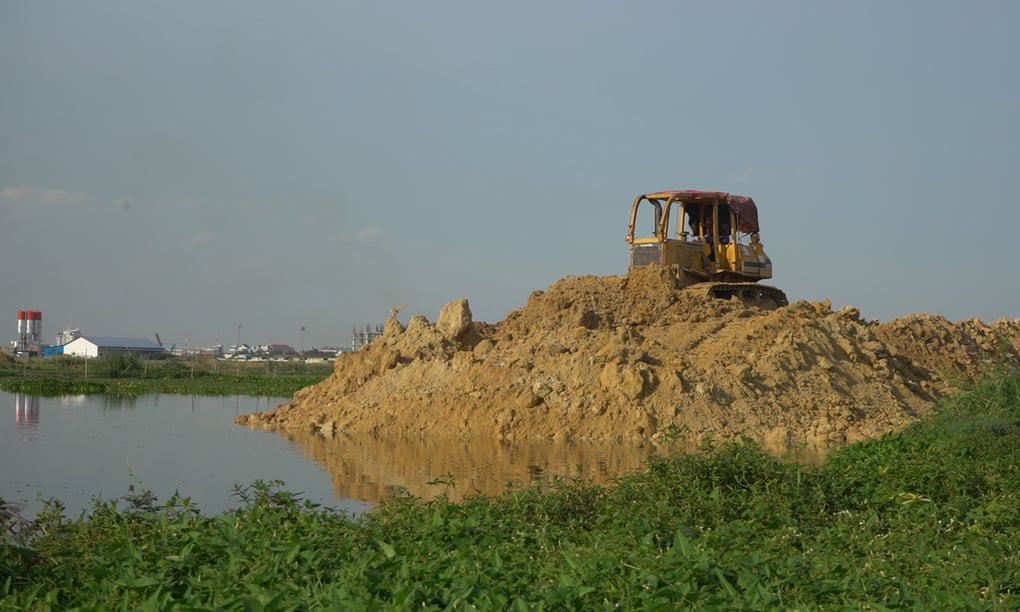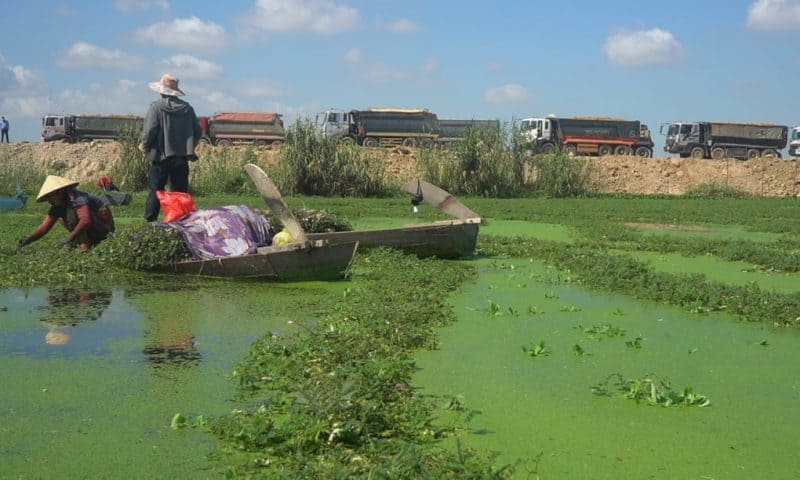New sprawling development near Phnom Penh could prompt environmental catastrophe, including for the capital’s water systems
The destruction of critically-important wetlands by politically-connected developers in Cambodia threatens to flood more than one million Phnom Penh residents, ruin the city’s wastewater system, force hundreds of families from their homes, and trigger environmental devastation, a new report has warned.
The sprawling Tompoun/Cheung Ek wetlands, just south of Phnom Penh, play a vital role in sustaining the Cambodian capital, acting as a natural store of 70% of its rain and wastewater and providing livelihoods for the more than 1,000 families who live, farm and fish in the area.
But a new report says that in 2004 developers, acting with government backing, began to gradually destroy the 1,500-hectare wetlands, filling them with sand dredged from the Mekong and Bassac rivers to prepare for the construction of a vast 2,500 hectare satellite city, dubbed “ING City”, the largest development in Cambodia.
The damning report released on Monday by an alliance of local land rights and human rights groups – Sahmakum Teang Tnaut, Equitable Cambodia, Cambodian League for the Promotion and Defense of Human Rights, and the Cambodia Youth Network – warns the development associated with ING City and other projects will destroy 90% of the wetlands, causing untold environmental damage and the potential eviction of hundreds of families.
The report, titled Smoke on the Water, warns the wetlands’ destruction will have “severe effects on the quality of life for an estimated one to two million people”, including placing one million Phnom Penh residents at increased risk of flooding.

The wetlands’ aquatic crops also act as a natural wastewater treatment system, preventing Phnom Penh’s raw sewage polluting the Bassac River and connected waterways and contaminating the fish stocks that many depend on, the report says.
The Cambodian government hopes that a $US26m wastewater plant funded with Japanese aid money will offset the wetlands’ loss. But the NGO report warns the facility would treat only 2% of the sewage flowing into the wetlands, making it a “wildly unfeasible” alternative.
The report warns that the extraction of the huge quantity of sand needed to fill the wetlands – estimated at a staggering 100m tonnes – has also been linked with the collapse of riverbanks on the Mekong.
“It will not just cause problems for the environment and flooding, but also the livelihood of the people who are living around the lake,” Eang Vuthy, executive director of Equitable Cambodia, told the Guardian.
“We estimate for the city, if there’s no proper plan in place to mitigate that, it will affect more than one million people. That does not include the untreated water that could flow directly into the river.”
A government spokesman told Reuters that reclaiming the wetlands was necessary for the city’s development, that environmental impact had been assessed, and that measures had been taken to mitigate the risks to flooding and wastewater.
“A canal is being built to divert excess water, and there is a wastewater treatment plant. Some relocations are necessary, but they have been given ample time to move,” Phay Siphan told Reuters.
Prime minister Hun Sen has been in power in Cambodia for 35 years and has waged a brutal campaign targeting NGOs, journalists, and opposition parties.
The Smoke on the Water report makes no mention of the political connections of the entities linked to the wetlands’ destruction, focussing entirely on the environmental and human rights implications.
However, the former Cambodian People’s Party secretary of state at the ministry of transport Ing Bun Hoaw, one of country’s most powerful tycoons and a Hun Sen ally, is involved in the project.
He is one of the founders of ING Holdings, the entity behind ING City.
One of the wetlands’ last protected areas was Boeung Cheung Ek, a large lake that was demarcated as public state land until 2017. The retention of that lake had eased fears about the impact of the ING City project. But local authorities have recently signalled their intention to develop Boeung Cheung Ek.
Between 2017 and 2019, a series of government sub-decrees converted roughly 70% of the lake to private land and leased plots to a series of companies and individuals, according to the report.
A Guardian analysis of corporate records and government documents reveals that some land at Boeung Cheung Ek was leased to people connected to Hun Sen and his government.
One sub-decree gave 37 hectares of land at Boeung Cheung Ek to a company named Orkide Villa Co Ltd, which lists Hun Mana, one of Hun Sen’s daughters, as a director and chair.
The NGO’s report also lists the Hero King Company Co Ltd as a supplier of sand for the ING City Project. Its parent company LYP Group Co Ltd is owned by Okhna Ly Yong Phat, an economic advisor to Hun Sen’s government.
Sophal Ear, an associate professor at Los Angeles’ Occidental College, said the wetlands were “nature’s way of protecting Phnom Penh”.
He labelled their destruction “inane”, but said the government did not appear to care.
“Phnom Penh’s floods grow worse year after year, and they see no correlation, no causation.”
The handing out of land to government allies at Boeung Cheung Ek was no surprise, he said.
“Sometimes it’s given to an advisor, so it’s someone who appears at least removed from the boldfaced name,” he said. “But here, in the case of Boeung Cheung Ek, they don’t even bother to masquerade it.”
The offices of Hun Sen, ING Holdings, LYP Group, and Orkide Villa Pty Ltd were all approached for comment, but did not respond.

